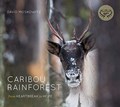Narrow Results By
Caribou rainforest : from heartbreak to hope
https://archives.whyte.org/en/permalink/catalogue25061
- Medium
- Library - Book (including soft-cover and pamphlets)
- Published Date
- 2018
- Author
- Moskowitz, David
- Publisher
- Seattle, WA : Braided River, the conservation imprint of Mountaineers Books
- Call Number
- 04.2 M85c
1 website
- Author
- Moskowitz, David
- Publisher
- Seattle, WA : Braided River, the conservation imprint of Mountaineers Books
- Published Date
- 2018
- Physical Description
- 204 pages : color illustrations, color maps
- Subjects
- Caribou
- Wildlife
- Conservation
- Alberta
- Rocky Mountains
- Abstract
- In a North American rainforest, that few people even know exists, about a dozen dwindling herds of caribou are struggling to survive. Caribou Rainforest doesn’t tell an easy story, ask easy questions, or pretend that there are easy solutions to the possible extinction of the last mountain caribou herds found in Canada and the United States. There are fewer than twenty animals left in the last US herd. Yet what Caribou Rainforest does—with photographs, words, and science—is explain why this is happening, so that as a community we don’t repeat our mistakes, even when our intentions are good. Author and photographer David Moskowitz has studied and photographed these caribou extensively in order to understand their plight. He hasn’t found villains, but rather climate change, predators, recreationists, settler colonialism, industrial logging, mineral extraction, and a perfect confluence of factors that have worked against this fragile species and the fragile environment upon which it relies. The story of this iconic animal and stunning landscape provides an example of shifting conservation challenges and tactics in the twenty-first century. Mountain caribou have been identified as an “umbrella species” by conservationists, meaning that protecting their habitat also helps preserve many other species who depend on the same ecosystem. The discussion topics are controversial and wrenching—upending the forestry economy of the region, exterminating wolves (who also struggle to survive) to protect the caribou, limiting recreational access to critical habitat, respecting the rights of indigenous peoples. The issues are contentious, but the opportunity to craft solutions still exists. If we do in fact lose the caribou, the task then pivots to how can we protect what remains of this rare rainforest ecosystem. In Caribou Rainforest, the author searches for lessons that can turn despair into hope: their story can become the inspiration and catalyst for committed change. (from Caribou Rainforest website)
- Contents
- North America's hidden rainforest. Map: Mountain caribou range : historical and current -- The mountains : our playground, their last refuge. Map: Overview of the Caribou Rainforest -- The Caribou Rainforest : a forest like none other. Map: Northwest inland temperate rainforest -- Mountain caribou : ghosts of the rainforest. Map: Historical and current caribou populations -- Wildlife of these mountains : a laboratory of evolution -- Human dimensions : the language of a landscape -- The path ahead : reflections on grief and hope -- Acknowledgments -- Source notes -- Selected bibliography -- Photographer's notes -- Get involved.
- Notes
- Banff Mountain Film and Book Festival finalist for Mountain Environment and Natural History
- ISBN
- 9781680511284
- Accession Number
- P2020-1
- Call Number
- 04.2 M85c
- Location
- Reading Room
- Collection
- Archives Library
- URL Notes
- Website for Caribou Rainforest project
Websites
This material is presented as originally created; it may contain outdated cultural descriptions and
potentially offensive content.
Read more.
Conservation forecast for the Rocky Mountain parks : partly sunny risk of thunderstorm
https://archives.whyte.org/en/permalink/catalogue14235
- Author
- Urquhart, Ian
- Responsibility
- by Ian Urquhart
- Physical Description
- p.14-15 : port
- Medium
- Library - Periodical
- Notes
- In Wild Lands Advocate, vol.21, no.2 (April/May 2013)
- Call Number
- P
- Collection
- Archives Library
This material is presented as originally created; it may contain outdated cultural descriptions and
potentially offensive content.
Read more.
Kwadacha park proposal
https://archives.whyte.org/en/permalink/catalogue14727
- Medium
- Library - Book (including soft-cover and pamphlets)
- Published Date
- c1967?
- Publisher
- Victoria, British Columbia : Department of Recreation and Conservation, Parks Branch
- Call Number
- 13.122 D44k Pam
- Responsibility
- Department of recreation and conservation, Parks Branch
- Publisher
- Victoria, British Columbia : Department of Recreation and Conservation, Parks Branch
- Published Date
- c1967?
- Physical Description
- 32 pages : illustrations, maps
- Notes
- Summary - "This report recommends to the Government of British Columbia establishment of a new Wilderness Provincial Park, in the northern Rocky Mountain Ranges
- Accession Number
- tbd
- Call Number
- 13.122 D44k Pam
- Collection
- Archives Library
This material is presented as originally created; it may contain outdated cultural descriptions and
potentially offensive content.
Read more.
Producing predators : wolves, work, and conquest in the northern Rockies
https://archives.whyte.org/en/permalink/catalogue26243
- Medium
- Library - Book (including soft-cover and pamphlets)
- Published Date
- 2016
- Author
- Wise, Michael D.
- Publisher
- Lincoln : University of Nebraska Press
- Call Number
- 08.3 W75p
- Author
- Wise, Michael D.
- Publisher
- Lincoln : University of Nebraska Press
- Published Date
- 2016
- Physical Description
- xxiii, 184 pages ; 24 cm
- Abstract
- Wise argues that contestations between Native and non-Native people over hunting, labor, and the livestock industry drove the development of predator eradication programs in Montana and Alberta from the 1880s onward. The history of these anti-predator programs was significant not only for their ecological effects, but also for their enduring cultural legacies of colonialism in the Northern Rockies.
- Contents
- List of illustrations -- Acknowledgments -- Introduction -- 1. Wolves and whiskey -- 2. Beasts of bounty -- 3. Making meat -- 4. The place that feeds you -- 5. Unnatural hunger -- Conclusion.
- ISBN
- 9780803249813
- Accession Number
- P2024.02
- Call Number
- 08.3 W75p
- Collection
- Archives Library
This material is presented as originally created; it may contain outdated cultural descriptions and
potentially offensive content.
Read more.


